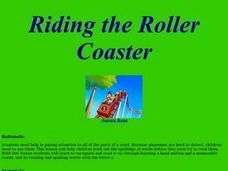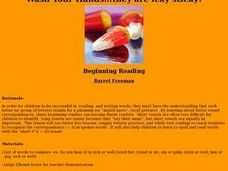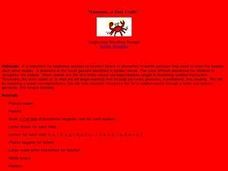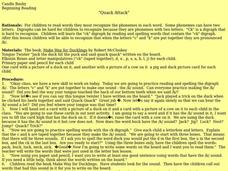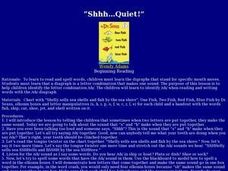Curated OER
Load the Boat To Travel the Moat
Students discover that letters stand for phonemes. They determine that spellings map out the phonemes that are found in spoken words. They analyze the correspondence, oa = /O/ and recognize the /O/ sound in spoken and written words in...
Curated OER
Opera Singer
Students recognize the short vowel o in written and spoken language. Through listening and decoding activities, they discriminate the vowel sound /o/ from other phonemes. Students identify the phoneme and letter in pseudo words they read.
Curated OER
Open Wide and Say Ahh
Students recognize the short vowel o in written and spoken language. Through matching and listening activities, they discriminate the vowel sound /o/ from other phonemes. Students identify the phoneme and letter in words and pictures.
Curated OER
Riding the Roller Coaster
First graders recognize the short vowel a in written and spoken language. Through matching and listening activities, they discriminate the vowel sound /a/ from other phonemes. Students associate the phoneme with its letter representation...
Curated OER
Wash Your Hands...they are icky sticky!
Students engage in an emergent literacy instructional activity that focuses on phonemic awareness and they practice corresponding the letter "i" to its long or short sound. This type of recognition has been found to be essential to...
Curated OER
Allie The Alligator
Learners recognize the short vowel a in written and spoken language. Through listening activities, they discriminate the vowel sound /a/ from other phonemes. Students associate the phoneme with its letter representation and identify them...
Curated OER
Fuzz Gets a Big Buzz
First graders recognize the short vowel u in written and spoken language. Through listening activities, they discriminate the vowel sound /u/ from other phonemes. Students identify the phoneme and letter in a decodeable story they read...
Curated OER
"Aaaaaaa...a Fast Crab! "
Students participate in an emergent literacy lesson that focuses on the skill of phonemic awareness. The phoneme chosen is the letter "a". They need to correlate the sound to the letter.
Curated OER
I Am Tired
First graders recognize the short vowel o in written and spoken language. Through listening and matching activities, they discriminate the vowel sound /o/ from other phonemes. Students associate the phoneme with its letter representation...
Curated OER
Shhhhh, the Baby's Asleep
Students identify the digraph /sh/ in written and spoken language. After a discussion of the independent and combined sounds of the phonemes /s/ and /h/ students practice identifying initial and final placement of the new digraph /sh/ in...
Curated OER
Solar System -- Writing Conventions
For this solar system worksheet, students learn writing conventions such as alliteration, similes, and acrostic poems. All pertain to the topic of space and solar system.
Curated OER
The Loud Trout Shouts!
Young scholars practice the strategies of phonemes and digraphs dealing with the correspondence "ou"=/ow/ in both spoken and written words. They listen as the book The Napping House by Audrey Wood is read to them and then they interact...
Curated OER
"Loud Cows All Around"
Students practice with vowel digraphs and how letters can correspond with phonemes. The activity consists of students learning the ou=/ow/ correspondence in which they will learn in both spoken and written words through reading and...
Curated OER
Elmer the Elephant
First graders recognize the short vowel E in written and spoken language. Through matching activities, they discriminate the short vowel /e/ from other phonemes. Students associate the phoneme with its letter representation and spell...
Curated OER
Quack Attack
Students identify phonemes in words. They read and spell words that contain the /ck/ digraph. Students read the book Make Way for Ducklings. They practice reading and identifying words with the ck digraph while reading the story.
Curated OER
"OU" O U Hurt Me!
Students explore the digraph ou=/ow/ in written and spoken words. They practice writing words with the ou=/ow/ digraph. Students match phonemes in words they hear. Students read The Napping House and identify words with the ou=/ow/ digraph.
Curated OER
Sammy the Slimy Snake
Young scholars engage in a emergent literacy instructional activity with the intention of improving reading comprehension. The goals of the instructional activity include recognizing both upper and lower case S, to create an awareness of...
Curated OER
Eddie the Egg
First graders recognize the short vowel e in written and spoken language. Through matching activities, they discriminate the short vowel /e/ from other phonemes. Students associate the phoneme with its letter representation and identify...
Curated OER
Ike's Ice Cream is Icy
Students recognize the short vowel i in written and spoken language. Through matching and listening activities, they discriminate the short vowel /i/ from other phonemes. Students associate the phoneme with its letter representation and...
Curated OER
Adam's Apples
Students recognize the short vowel "A" in written and spoken language. Through matching and listening activities, they discriminate the short vowel /a/ from other vowel phonemes. Students associate the phoneme with its letter...
Curated OER
Fish Wish
Students identify the digraph /sh/ in written and spoken language. After a reading of a decodable story containing the digraph, students practice identifying the initial and final placement of the new digraph /sh/ in words using a...
Curated OER
Shhh! Quiet!
Students become aware that when certain letters are put together in a word they are said with a single mouth move. Through modeling and a variety of guided practice activities they explore the /sh/ phoneme. They read and identify 'sh'...
Curated OER
U-u-under The U-u-umbrella!
Students practice using phonemes because they need to be able to recognize that phonemes and letters correspond with each other in order to become a proficient reader. The practice is done using the letter "u".
Curated OER
Choo Choo Train
Students identify the digraphs in written and spoken language. After a brief discussion of the combinations of /c/ and /h/ that comprise th /ch/ digraph, students practice identifying initial and final placement of the digraph /ch/ in...





